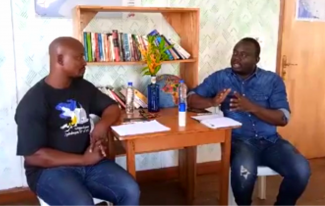LDPC Wants support for At-Risk Youths, as Liberian Government Prepares Economic Stimulus

The Liberia Drug Policy Coalition (LDPC), a national umbrella organization and the lead campaigner for Drug Policy Reform in Liberia has made the latest call on the Liberian Government to ensure that Substance users also referred to as at-risk youth be earmarked in the distribution of food and other relief activities during this health emergency period.
Speaking at the I-Campus in Monrovia when he served as a guest on the Accountability Lab live video broadcast, the Coordinator of LDPC and 2019 Accountapreneur, James Koryor stated that the action by the Liberian Government to provide free food and other support to vulnerable groups in the country during this COVID-19 period is commendable, but want a well-structured procedure for supporting substance users since many of them are homeless and lack the materials to prepared food for themselves.
The LDPC official also stated his institution have noticed other organizations including member organizations of the Coalition have initiated different programs aimed at providing a meal to substance users living on the streets across Montserrado County and that it will be prudent if the Government can engage with those institutions to enhance the already existing activities and expand on the gains that have been made other than reinventing the wheels.
Mr. Koryor used the occasion to remind policymakers that the manner in which drug issue has been handled in the country shows that there is no tangible or well structure program to address the current drug problem faced by young people in the country, stressing that the sector is fragmented and lacks coordination, stressing that it will be imperative to establish a specialized and dedicated institution to address the many challenges facing the sector.
The LDPC executive also stated that his organization has communicated with governmental institutions and other key stakeholders managing the National COVID-19 Response and the National Household Food Support Program to place more emphasis on substance users who are also a threat to our peace and security.
“It is time we start to think how we can all address the issue of drug abuse in Liberia rather than waiting for a situation such as the COVID-19 to give a handout to vulnerable young people” Koryor stressed. The drug policy activist also stated that there is an urgent to reform our drug laws and policies that are evidence-based, data-driven, and take into account human rights other than just focusing on law enforcement when in fact, those law enforcement institutions are underfunded to combat drug trafficking in Liberia.
Koryor also stated that during a recent outreach activity, it was discovered that SGBV has increased against female substance users who are also sexually abused and exploited on a daily basis, because of the difficulties and hardship faced them during this COVID-19.
The LDPC coordinator stressed that his institutions will continue to engage the relevant stakeholders to ensure that substance users living on the streets are considered as primary or key beneficiaries of different social welfare and safety net programs more especially during this global health emergency.
The Liberia Drug Policy Coalition-LDPC is a consortium of registered Civil Society Organizations established by Alumnus of the West Africa Executive Course on Human Rights & Drug Policy supported by Open Society Initiative for West Africa, University of Ghana School of Law, and funded by the Open Society Foundation.
LDPC is a national umbrella organization and the lead campaigner for Drug Policy Reform in Liberia. LDPC comprises of seven (7) civil society organizations who are members of the West Africa Drug Policy Network (WADPN) and the International Society of Substance Use Professionals (ISSUP) advocating and promoting drug policies that are evidence-based and data-driven that take into account public health and human rights in Liberia.
LDPC develop, implement, and manage programs and projects that are built on four fundamental pillars also known as the RAAC agenda: Research, Advocacy, Awareness & Capacity. LDPC advocate and create awareness for the popularization and domestication of the Model Drug Law for West Africa, decriminalization of drug laws and policy, collect, analyze and provides qualitative and quantitative data that are vital and imperative to drug policy reform in Liberia.